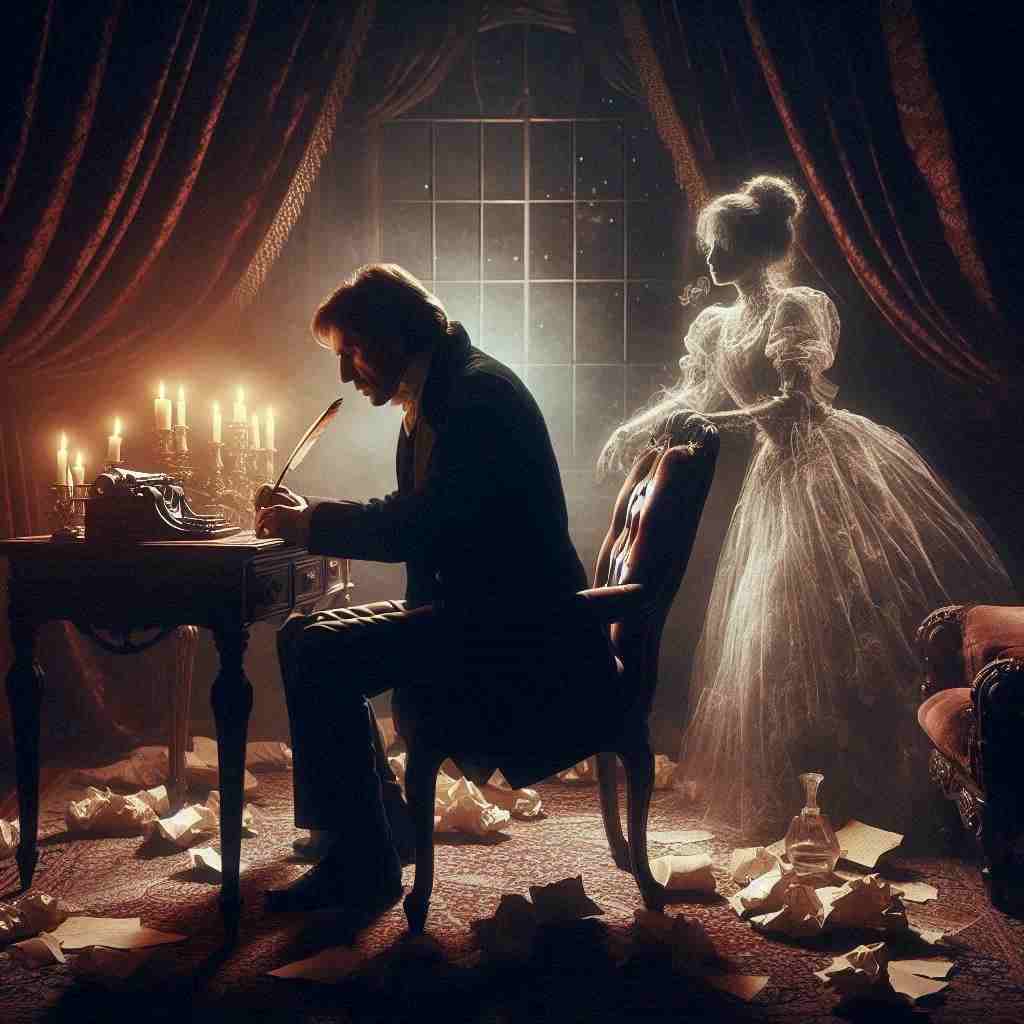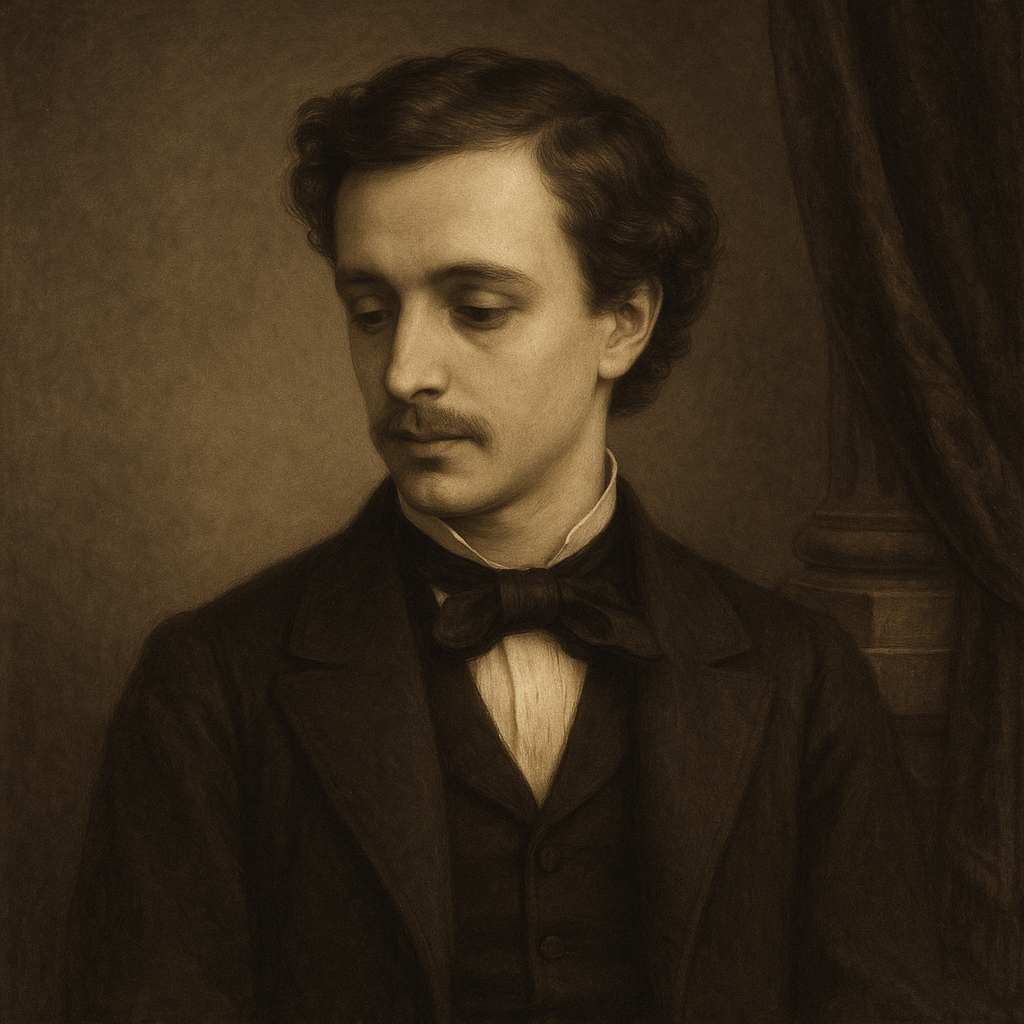A little time for laughter
Philip Bourke Marston
1850 to 1887

A little time for laughter,
A little time to sing,
A little time to kiss and cling,
And no more kissing after.
A little while for scheming
Love's unperfected schemes;
A little time for golden dreams,
Then no more any dreaming.
A little while 'twas given
To me to have thy love;
Now, like a ghost, alone I move
About a ruined heaven.
A little time for speaking
Things sweet to say and hear;
A time to seek, and find thee near,
Then no more any seeking.
A little time for saying
Words the heart breaks to say;
A short sharp time wherein to pray,
Then no more need of praying;
But long, long years to weep in,
And comprehend the whole
Great grief that desolates the soul,
And eternity to sleep in.
Philip Bourke Marston's A little time for laughter
Introduction
Philip Bourke Marston's poignant poem, untitled but often referred to by its first line "A little time for laughter," is a masterful exploration of the ephemeral nature of love and the enduring pain of loss. This six-stanza work, with its haunting refrain and carefully crafted structure, offers a profound meditation on the transience of human happiness and the inevitability of sorrow. Through a close analysis of its form, language, and thematic content, we can uncover the layers of meaning embedded within this deceptively simple yet deeply moving piece of Victorian poetry.
Structural Analysis
The poem's structure is integral to its impact. Composed of six quatrains, each stanza follows a consistent AABB rhyme scheme, creating a rhythmic pattern that echoes the cyclical nature of life and love described within the verses. The repetition of "A little time" at the beginning of the first four stanzas establishes a melancholic cadence, emphasizing the brevity of joyful experiences and foreshadowing the impending loss.
This repetitive structure serves multiple purposes. First, it creates a sense of urgency, as if the speaker is acutely aware of time slipping away. Second, it reinforces the theme of life's fleeting pleasures, each "little time" representing a precious moment that cannot be recaptured. Finally, the abrupt shift in the fifth stanza, where "A little time" is replaced by "But long, long years," marks a dramatic turning point, signaling the transition from temporary joy to eternal grief.
Thematic Exploration
At its core, Marston's poem is an elegiac meditation on love lost and the crushing weight of bereavement. The work progresses through stages of a relationship, from its joyous beginnings to its tragic end, mirroring the stages of grief in reverse. This inverted structure adds to the poem's poignancy, as the reader is made acutely aware of the inevitable conclusion from the outset.
The first stanza introduces the theme of love's transience with vivid, sensual imagery: "A little time for laughter, / A little time to sing, / A little time to kiss and cling." These lines evoke the intoxicating early stages of romance, filled with physical affection and unbridled joy. However, the ominous final line, "And no more kissing after," immediately casts a shadow over this blissful scene, foreshadowing the relationship's demise.
As the poem progresses, Marston explores the various facets of love, from the hopeful planning of a shared future in the second stanza ("Love's unperfected schemes") to the intimate moments of connection in the fourth ("Things sweet to say and hear"). Each stanza, however, ends with a stark reminder of the love's impermanence, creating a tension between the fleeting present and the looming future.
Imagery and Symbolism
Marston's use of imagery is particularly effective in conveying the emotional journey of the speaker. The third stanza introduces the powerful metaphor of a "ruined heaven," comparing the loss of love to a fall from grace. This religious allusion adds depth to the poem, suggesting that the experience of love is akin to a divine state, making its loss all the more devastating.
The ghostly imagery in this stanza ("Now, like a ghost, alone I move") further emphasizes the speaker's sense of disconnection and alienation in the aftermath of loss. This spectral metaphor is particularly poignant, implying that the speaker, bereft of love, now exists in a liminal state between life and death.
The fifth stanza introduces a shift in tone and imagery, moving from the sweetness of love to the bitterness of farewell. The phrase "Words the heart breaks to say" encapsulates the anguish of parting, while the reference to prayer suggests a desperate appeal to a higher power, perhaps for reconciliation or for the strength to endure the impending sorrow.
Language and Tone
Marston's choice of language throughout the poem is deceptively simple yet deeply evocative. The repetition of "little" emphasizes the brevity of happiness, while words like "laughter," "sing," and "kiss" in the opening stanza create a sensory experience of joy that contrasts sharply with the somber tone of the concluding verses.
The poet's use of active verbs in the early stanzas ("laughter," "sing," "kiss," "scheming," "dreaming") gives way to more passive constructions in the later verses ("move," "weep," "sleep"), reflecting the shift from vibrant engagement with life to a state of helpless suffering.
The final stanza marks a dramatic tonal shift, with the introduction of "long, long years" contrasting starkly with the preceding "little times." This juxtaposition emphasizes the asymmetry of love and loss – the fleeting nature of happiness versus the seeming eternity of grief. The use of powerful words like "weep," "comprehend," and "desolates" in this stanza conveys the overwhelming nature of the speaker's sorrow.
Biographical Context
While it is important to avoid the biographical fallacy, it is worth noting that Philip Bourke Marston's life experiences likely informed the emotional depth of this poem. Marston, who was blind from an early age, experienced significant personal losses throughout his life, including the death of his fiancée. This background may have contributed to the acute sense of transience and loss that permeates the work.
However, the universal themes and emotional resonance of the poem transcend personal experience, speaking to the human condition in a way that remains relevant and moving to readers across time and cultures.
Literary Context
Marston's poem can be situated within the broader context of Victorian poetry, particularly in its exploration of love, loss, and mortality. Echoes of Tennyson's elegiac works, such as "In Memoriam A.H.H.," can be heard in Marston's meditation on grief, while the poem's focus on the ephemeral nature of happiness recalls the works of A.E. Housman.
The poem's structure and themes also invite comparison with metaphysical poetry, particularly in its exploration of the relationship between physical and spiritual love, and its use of paradox to convey complex emotional states.
Conclusion
"A little time for laughter" stands as a testament to Philip Bourke Marston's poetic skill and emotional insight. Through its carefully crafted structure, evocative imagery, and nuanced exploration of love and loss, the poem offers a profound meditation on the human experience of grief.
The work's power lies in its ability to capture the universality of loss while maintaining a deeply personal emotional core. By juxtaposing moments of joy with the inevitability of their passing, Marston creates a poignant reflection on the nature of time, love, and mortality.
Ultimately, the poem leaves us with a bittersweet appreciation for the fleeting moments of happiness we experience, even as it acknowledges the pain that often follows. In doing so, it speaks to the resilience of the human spirit in the face of sorrow, and the enduring power of love, even when it exists only in memory.
This text was generated by AI and is for reference only. Learn more
Want to join the discussion? Reopen or create a unique username to comment. No personal details required!



Comments
No comments yet. Be the first to comment!